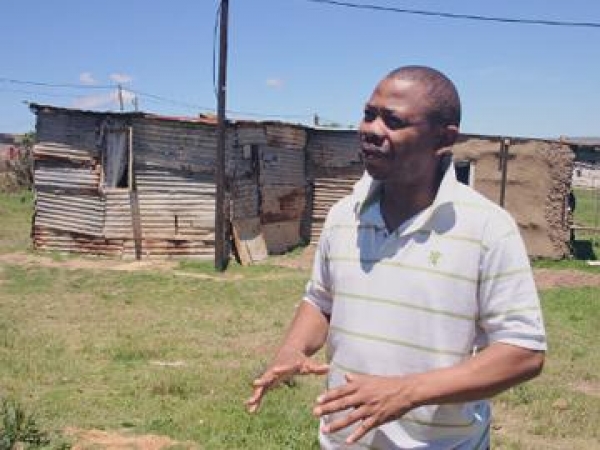
23 February 2024

Ayanda Kota founded the Unemployed People’s Movement and was Makhanda’s most well-known activist. Archive photo (2013): Jon Pienaar
Ayanda Kota, who founded the Unemployed People’s Movement (UPM) in 2009, has died of cancer. He was born in Grahamstown in 1976, now Makhanda, and died here. It was in Makhanda and Cape Town that he dedicated his life to fighting for the rights of poor people.
He went to Nombulelo Secondary School in Makhanda’s Joza location. At the age of 15 he joined the Black Consciousness Movement, which Steve Biko had started in the 1970s. In 1995 he was elected chairperson of the Azanian Student Movement in Cape Town.
In 2014, Kota wrote an opinion piece for GroundUp under the title, “[Julius] Malema should learn black consciousness is a philosophy of love not hatred”, in which he wrote: “A real revolutionary must always be very careful to avoid becoming like the oppressor.”
Kota consistently took this line, also criticising both presidents Zuma and Ramaphosa.
He was regularly in the maelstrom of protests we reported on; over water shortages and failed refuse collection, saying: “It’s simple – the ANC has failed the people of the city.”
Among many reports involving Kota and his movement over the years, in 2019 we reported how the UPM protested in Makhanda ahead of Ramaphosa’s Freedom Day rally by strewing the cavalcade route with faeces.
The UPM had by then also filed a court application calling for the dissolution of the local council for failing to “ensure the provision of services to communities in a sustainable manner”. UPM’s court battle to place the municipality under administration continued for years, until the court found in its favour in 2020. Kota said: “Democracy has been served.”
People paid tribute to Kota’s life on Thursday.
UPM chairperon Mahlubandile Kuhlane said: “Ayanda was the true definition of the word selflessness.” He said Kota put the needs of his community before his needs, or even the needs of his family.
Activist Brian Ashley said he met Kota when they were running a right-to-work campaign to deal with unemployment. He said that Kota, “together with two comrades had come down to Cape Town and staged a three person demonstration where they tied themselves to the gates of Parliament demanding a basic income grant for the unemployed”.
Ashley said Kota was a socialist and a humanist.
“It is Ayanda who led the struggle to put the Makana Municipality under administration for their total mismanagement, corruption and dereliction of duty when it came to the delivery of essential services,” said Ashley.
He said Kota also led struggles for land reform and redistribution, against gender based violence, and for decent education. “In short he was an amazing human being who contributed tremendously to the development of popular social movements. His death at the tender age of 48 is a great loss for all those who struggle against neoliberal capitalism, cronyism and corruption.”
Professor Pedro Tabensky of Rhodes University, said: “My dear friend Ayanda Kota passed on Thursday around 6am of cancer. He has been sick for quite a while. I met him 15 years ago and I have been with him since then. He was very firm against corruption. Since the formation of the UPM he has been one of the people keeping it alive. He was always open to new ideas.”
Mziyanda Bulani, a close friend, said he met Kota in the early ‘90s in high school. “He became more than an activist. Kota was a people’s person who respected each and everyone. … Phaphamani and Ethembeni informal settlements have electricity today because of the struggles of Kota,” said Bulani.
Kota was also involved in sport. In 2005 he formed the United Fighters Football Club in Cape Town. In 2007 he was elected shop steward at a retail company in Cape Town and was subsequently dismissed for union activities.
Kota’s older sister Mandisa Maxegwana said he has left a big void in their family. Kota is also survived by his partner Babalwa Budaza, his mother Nomentsu Kota and five children: Sibalwethu, Simamkele, Molemo, Imithandazo and Nosisa.